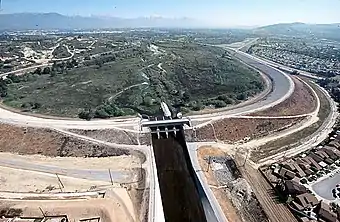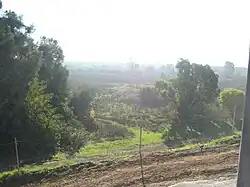Whittier Narrows
The Whittier Narrows is a narrows or water gap in the San Gabriel Valley of Los Angeles County, California, United States, between the Puente Hills to the east[2] and the Montebello Hills to the west.[3] The gap is located at the southern boundary of the San Gabriel Valley,[4] through which the Rio Hondo[5] and the San Gabriel River flow to enter the Los Angeles Basin. The Narrows is located near the convergence of Interstate 605 (the San Gabriel River Freeway) and California State Route 60 (the Pomona Freeway).
| Whittier Narrows | |
|---|---|
 Aerial view of Whittier Narrows Dam from downstream looking upstream through the gap. | |
| Elevation | 183 ft (56 m)[1] |
| Traversed by | |
| Location | North of Whittier, California |
| Range | Puente Hills / Montebello Hills |
| Coordinates | 34°01′45″N 118°02′58″W[1] |
History
The Tongva village of Shevaanga was located in the northern areas of the Whittier Narrows.[6][7] The first European land exploration of Alta California, the Spanish Portolá expedition, traversed Whittier Narrows on its return journey to San Diego. He wrote that the natives "presented us fish, hare, nuts, pine nuts, acorns, and other seeds prepared after their fashion".[8] On the outbound journey, the party had followed San Jose Creek, reaching the San Gabriel River north of the Narrows. Franciscan missionary Juan Crespi noted in his diary, "We started out in the morning through the gap of the valley of San Miguel [now San Gabriel], which is very full of trees. We traveled a long while to the southwest on the edge of the stream, which, rising from a copious spring of water in the same gap, merits now the name of river; its plain is covered with willows and some slender cotton woods."
From the exploration Mission Vieja was built at Whittier Narrows in 1771. A flood in 1776 caused Mission Vieja to move to Mission San Gabriel Arcángel in San Gabriel.[9] Whittier Narrows was the meeting point for boundary corners of several land-grant ranchos, created during the Spanish-Mexican era, including the Rancho Paso de Bartolo.
On October 1, 1987 at 7:42 a.m. PDT, the 5.9 Mw Whittier Narrows earthquake affected the Greater Los Angeles Area with a maximum Mercalli intensity of VIII (Severe).
In October 2008, a proposed new interpretive center drew controversy over the potential destruction of a large amount of existing wildlife habitat.[10]
Whittier Narrows Recreation Area

The Whittier Narrows Recreation Area is a 1,500-acre (6.1 km2) multi-use facility, mostly in an unincorporated part of Los Angeles County, containing North Lake, Center Lake, and Legg Lake (where radio-controlled model speedboats may be operated), a rifle and pistol shooting range, numerous softball and soccer fields with picnic tables, a paved airstrip for radio-controlled hobby aircraft, a tether car race track, a USA BMX race track, and a connector trail between the Class I Rio Hondo bicycle path and the San Gabriel River bicycle path.[11]
The park is roughly bordered by Garvey Avenue and San Gabriel Blvd to the north and west and Durfee Avenue and Santa Anita/Merced Avenues to the south and east. A convenient point of access is the Rosemead Blvd (State Route 19) exit south from the Pomona (60) Freeway.
Within the Recreation Area is the Whittier Narrows Nature Center, which contains exhibits about the plants and animals of the river environment, including live displays. The center offers public programs, lectures, ranger tours and education programs.
Dragon sculptures by Benjamin Dominquez can be seen here; others are at Laguna de San Gabriel Nautical Playground at Vincent Lugo Park in San Gabriel.[11]
Whittier Narrows Dam
The Whittier Narrows Dam is a flood control and water conservation project constructed and operated by the U.S. Army Corps of Engineers, Los Angeles District. It collects runoff from the uncontrolled drainage areas upstream along with releases from the Santa Fe Dam, and can redirect flows into the Rio Hondo or the downstream San Gabriel. It was completed in 1957.[12]
See also
References
- "Delaware Water Gap". Geographic Names Information System. United States Geological Survey. Retrieved August 29, 2008.
- "Puente Hills". Geographic Names Information System. United States Geological Survey, United States Department of the Interior.
- "Montebello Hills". Geographic Names Information System. United States Geological Survey, United States Department of the Interior.
- "San Gabriel Valley". Geographic Names Information System. United States Geological Survey, United States Department of the Interior.
- "Rio Hondo". Geographic Names Information System. United States Geological Survey, United States Department of the Interior.
- "Gabrielino/Tongva Nation of the Greater Los Angeles Basin". NAHC Digital Atlas. Retrieved April 25, 2023.
- Greene, Sean; Curwen, Thomas (May 9, 2019). "Mapping the Tongva villages of L.A.'s past". Los Angeles Times. Retrieved April 25, 2023.
- Sahagún, Louis; Greene, Sean (October 9, 2023). "Tribal leaders and researchers have mapped the ancient 'lost suburbs' of Los Angeles". Los Angeles Times. Retrieved October 9, 2023.
- Bolton, Herbert E. (1927). Fray Juan Crespi: Missionary Explorer on the Pacific Coast, 1769–1774. HathiTrust Digital Library. p. 270. Retrieved February 21, 2019.
- Sahagún, Louis (October 12, 2008). "Plans for major overhaul of Whittier Narrows nature preserve stir passions". Los Angeles Times. Retrieved October 12, 2008.
- Fleming, Charles (2015). "22". Secret walks : a walking guide to the hidden trails of Los Angeles. Solana Beach, California. ISBN 978-1-59580-821-9. OCLC 912325615.
{{cite book}}: CS1 maint: location missing publisher (link) - Sahagún, Louis (February 18, 2019). "Rare L.A. mega-storm could overwhelm dam and flood dozens of cities, experts say". Los Angeles Times. Retrieved February 20, 2019.